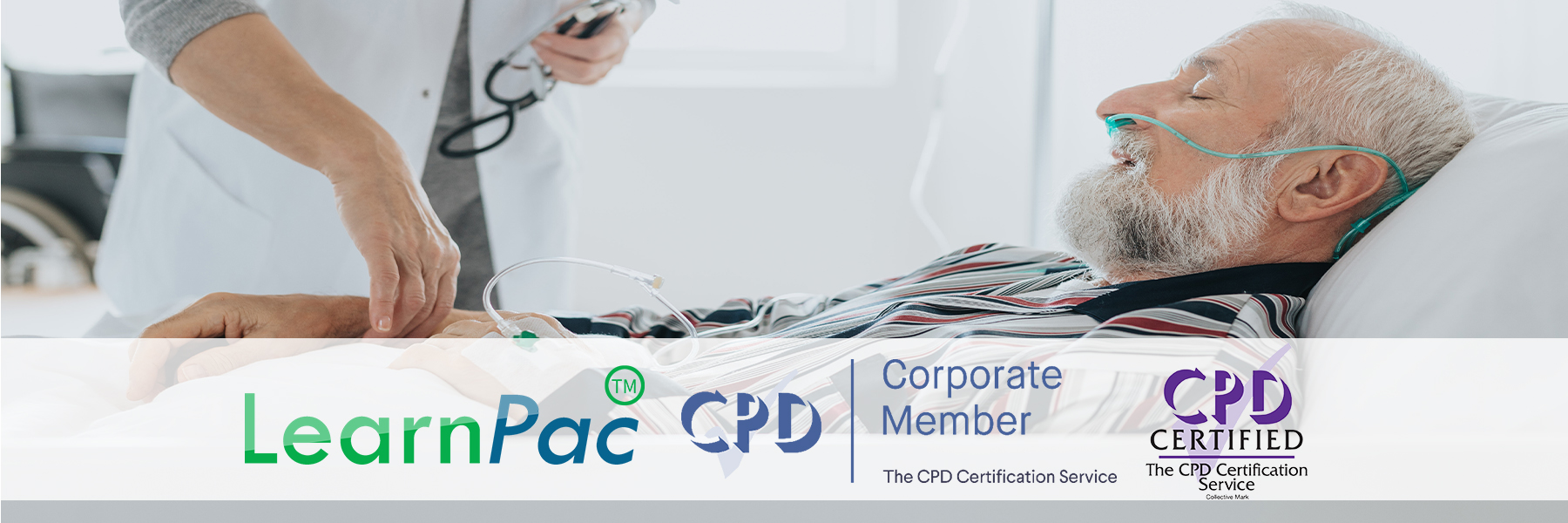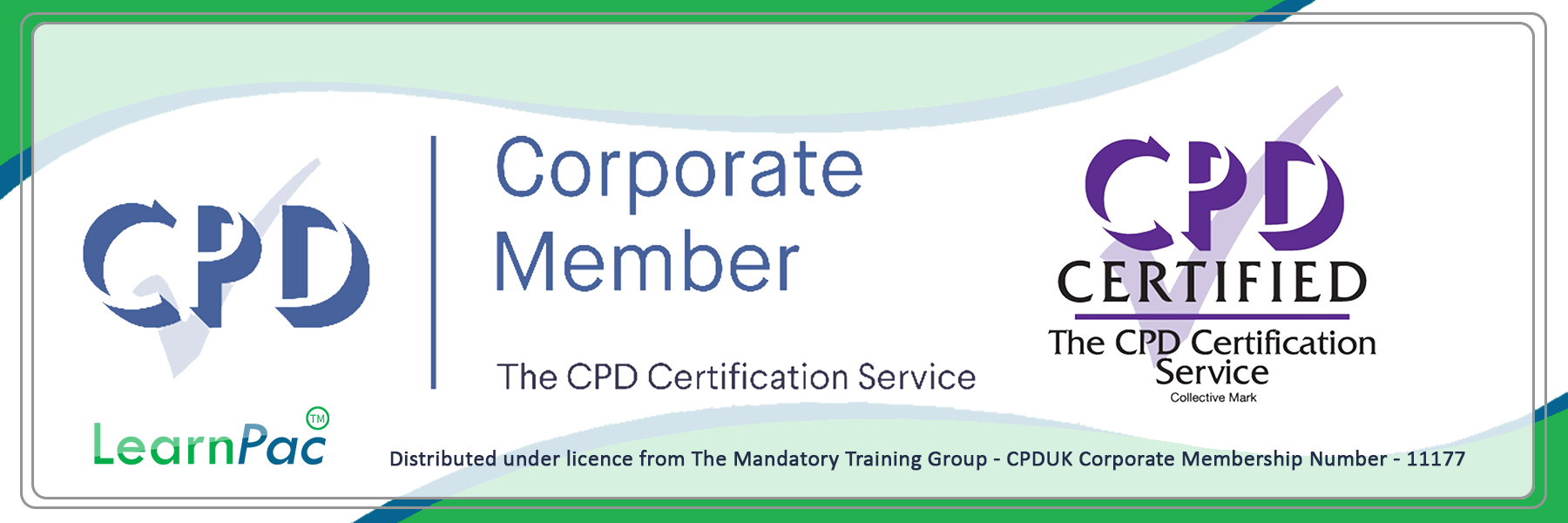End of Life Care Training - E-Learning Courses - CPD Accredited

End of Life Care Training – E-Learning Courses with Certificates – CPDUK Accredited.
LearnPac Systems is the leading UK provider of accredited online training courses, programmes and qualifications. Our interactive learning management system (LMS) can easily be customised to individual organisations, regardless of the size or sector.
End of life care refers to health care for a person with a terminal condition that has become advanced, progressive, or incurable. End of life care training helps in improving the quality of life for someone who has a life-limiting illness by offering services, advice, information, referral and support. It also provides emotional and practical support to families, friends and carers.
These end of life care training courses aim to enhance the training and education of the health and social care workforce so that well-informed high-quality care can be delivered by confident and competent staff and volunteers to support people wherever they happen to be.
Browse our End of Life Care Training - E-Learning Courses
End of Life Care Training: Frequently Asked Questions and Answers
End of Life Care Training – E-Learning Courses with Certificates – CPDUK Accredited – LearnPac Systems UK.
Here at LearnPac Systems, we receive many questions about end of life care. We have provided answers to the most frequently asked questions about end of life care.
Click on the text below to see the answers to the Frequently Asked Questions about End Of Life Care.
End of life care refers to health care for a person with a terminal condition that has become advanced, progressive, or incurable.
LearnPac Systems is the leading UK provider of accredited online training courses, programmes and qualifications. Our interactive learning management system (LMS) can easily be customised to individual organisations, regardless of the size or sector.
Click here for End of Life Care Training – E-Learning Courses – CPD Certified
Palliative care is an approach that improves the quality of life of patients and their families who are facing difficulties associated with life-threatening illness through the prevention and relief of suffering. Palliative care involves early identification, impeccable assessment and treatment of pain and other physical, psychosocial and spiritual issues.
End of life care intends to help you to live as comfortably as possible in the time you have left. It involves managing physical symptoms and getting emotional support for you, your family and friends. You might need more of this type of care towards the end of your life.
LearnPac Systems is the leading UK provider of accredited online training courses, programmes and qualifications. Our interactive learning management system (LMS) can easily be customised to individual organisations, regardless of the size or sector.
Click here for End of Life Care Training – E-Learning Courses – CPD Certified
The concepts are similar, but not the same. Palliative does encompass the end of life care, yet it is so much more. It involves the treatment of individuals who have a serious illness in which a cure or complete reversal of the disease and its process is no longer possible.
The aims of end of life care are as follows:
- To maintain the comfort, choices, and quality of life of a person who is recognised to be dying (in the terminal phase)
- To support their individuality
- To care for the psychosocial and spiritual needs of themselves and their families.
LearnPac Systems is the leading UK provider of accredited online training courses, programmes and qualifications. Our interactive learning management system (LMS) can easily be customised to individual organisations, regardless of the size or sector.
Click here for End of Life Care Training – E-Learning Courses – CPD Certified
You may start palliative care at any stage of your illness, even as soon as you receive a diagnosis and begin treatment. You do not have to wait until your disease has reached an advanced stage or when you’re in the final months of life. The earlier you start palliative care, the better.
Working with people living with a terminal illness in their homes or in a hospice is very different from working in a hospital. You have more time to spend caring for each patient, getting to know them and meeting their individual needs.
For this reason, palliative care nursing can lead to great job satisfaction, as you know you’re helping to improve someone’s quality of life, at a point when it’s most precious.
The following are five physical signs of impending death:
- Loss of appetite
- Increased physical weakness
- Laboured breathing
- Changes in urination
- Swelling of feet, ankles and hands.
Palliative care is specialised medical care for people with serious illness. It focuses on providing relief from the pain, symptoms and stress of a serious illness.
The core palliative care team typically includes palliative care doctors, nurses and social workers.
This end of life care training course is for people interested in or engaged in matters relating to death, dying, bereavement, palliative and end of life care.
The course is also beneficial to those who work in healthcare, including physicians, nurses, social workers, and other health and social care professionals.
LearnPac Systems is the leading UK provider of accredited online training courses, programmes and qualifications. Our interactive learning management system (LMS) can easily be customised to individual organisations, regardless of the size or sector.
Click here for End of Life Care Training – E-Learning Courses – CPD Certified
The core principles for end of life care are as follows:
- Respecting the dignity of both patient and caregivers;
- Be sensitive to and respectful of the patient’s and family’s wishes;
- Use the most appropriate measures that are consistent with patient choices;
- Encompass alleviation of pain and other physical symptoms;
- Assess and manage psychological, social and spiritual/religious problems;
- Offer continuity (the patient should be able to continue to be cared for, if so desired, by his/her primary care and specialist providers);
- Provide access to any therapy which may realistically be expected to improve the patient’s quality of life, including alternative or non-traditional treatments;
- Provide access to palliative and hospice care;
- Respect the right to refuse treatment;
- Respect the physician’s professional responsibility to discontinue some treatments when appropriate, with consideration for both the patient and family’s preferences;
- Promote clinical and evidence-based research on providing care at the end of life.
After taking this end of life course, you will enhance your skills and knowledge on the following aspects:
- Develop an interdisciplinary approach to end of life care
- Understand the ethical issues surrounding end of life care
- Learn the special characteristics of hospice and palliative care
- Understand pain management and assessment, as well as physiologic changes patients may experience
- Learn how to help patients and families cope with death, dying and grief
- Understand cultural considerations surrounding end of life care.
End of life and palliative care helps in improving the quality of life for someone who has a life-limiting illness by offering services, advice, information, referral and support. End of life and palliative care also provides emotional and practical support to families, friends and carers.
Furthermore, palliative care can help you plan your care using an advance care plan.
End of life care is delivered by a wide range of providers. Many people who work in health, human services or community agencies can help provide end of life care, such as:
- Staff at your local community health centre
- Staff at your GP clinic
- Staff at your local rural clinic
- Local government agencies
- Cultural and religious service providers
- Residential care facilities
- Disability services
- Medical specialists.
Person-centred palliative care strives to make the whole person visible. It prioritises the satisfaction of spiritual, existential, social, and psychological needs to the same extent as physical needs.
NHS continuing healthcare means a package of care that is arranged and funded by the NHS and is free of charge to the person receiving the care. This is sometimes called “fully funded NHS care”.
End of life care should begin when you need it and may last for a few days, months or even years.
LearnPac Systems is the leading UK provider of accredited online training courses, programmes and qualifications. Our interactive learning management system (LMS) can easily be customised to individual organisations, regardless of the size or sector.
Click here for End of Life Care Training – E-Learning Courses – CPD Certified
When providing end of life care, ensure to:
- Treat people compassionately.
- Listen to people.
- Communicate clearly and sensitively.
- Identify and meet the communication needs of each individual.
- Acknowledge pain and distress and take action.
- Recognise when someone may be entering the last few days and hours of life.
- Involve people in decisions about their care and respect their wishes.
- Keep the person who is reaching the end of their life and those important to them up-to-date with any changes in condition.
- Document a summary of conversations and decisions.
- Seek further advice if needed.
- Look after yourself and your colleagues and seek support if you need it.
If you are approaching the end of life or caring for someone who is, and you want to find out about the care and support available, your first step is to speak to your GP or to call the number your healthcare professionals have given you.
LearnPac Systems is the leading UK provider of accredited online training courses, programmes and qualifications. Our interactive learning management system (LMS) can easily be customised to individual organisations, regardless of the size or sector.
Click here for End of Life Care Training – E-Learning Courses – CPD Certified
You may not need any formal qualifications to start work as an end of life care assistant, but GCSEs grades (A* to C) in English and maths may be useful in helping you to find a job. Some employers may also want you to have a level 2 qualification in health and social care, like a certificate, diploma, GCSE or NVQ.
An end of life (terminal) care pathway or plan is a document that guides the steps needed to provide high-quality care to the resident in the last week or days of their life. A resident will be started on a pathway when there are signs, or they show symptoms or physical changes, suggesting that they may be dying.
Experts have agreed that there are five essential priorities for the care and support that you and your carers can expect to receive in the last few days and hours of life. These include:
- You should be seen by a doctor regularly, and if they believe you will die very soon, they must explain this to you and the people close to you.
- The staff involved in your care should talk sensitively and honestly to you and the people close to you.
- You and the people close to you should be involved in decisions about how you are treated and cared for if this is what you want.
- The needs of your family and other people close to you should be met as far as possible.
- An individual plan of care should be agreed with you and delivered with compassion.
Yes, our end of life care training courses are externally peer-reviewed and accredited by the CPD Certification Service (CPDUK). The Mandatory Training Group work with the CPD Certification Service to develop and accredit comprehensive content in line with current UK legislation, regulatory framework and recommendations from professional organisations. Click here to see our CPDUK accreditation credentials.
LearnPac Systems is distributed under the licence from The Mandatory Training Group – CPDUK Corporate Memebrship Number – 1117
We are the leading UK providers of accredited online training courses, programmes and qualifications that are approved by the following organisations:
- CPD Certification Service (CPDUK),
- Training Qualifications UK (TQUK),
- Royal Society for the Prevention of Accidents (RoSPA),
- Gatehouse Awards,
- Independent Asbestos Training Providers (IATP),
- Institution of Fire Engineers (IFE), and
- International Institute of Risk and Safety Management (IIRSM).
LearnPac Systems is the leading UK provider of accredited online training courses, programmes and qualifications. Our interactive learning management system (LMS) can easily be customised to individual organisations, regardless of the size or sector.
Click here for End of Life Care Training – E-Learning Courses – CPD Certified



